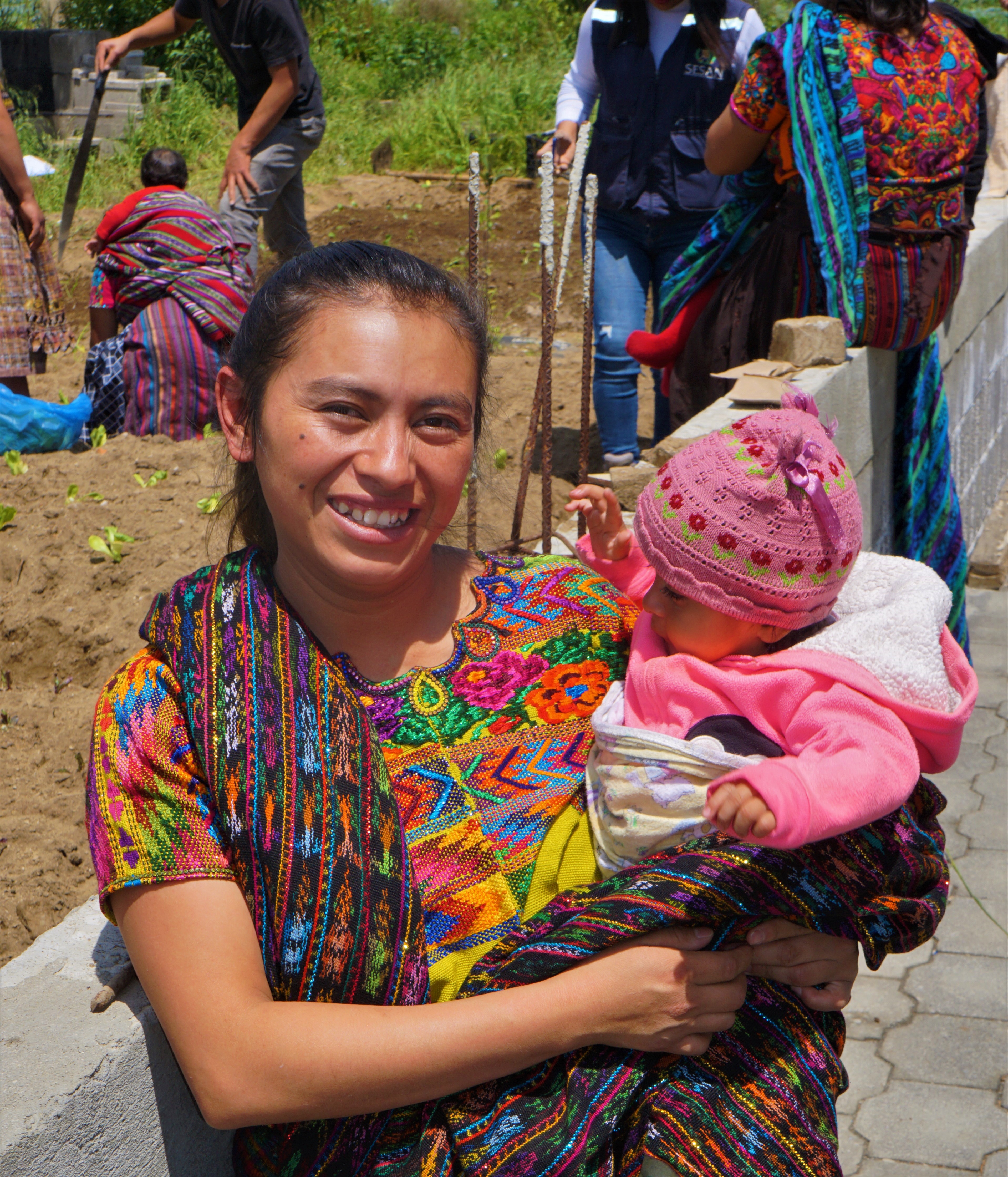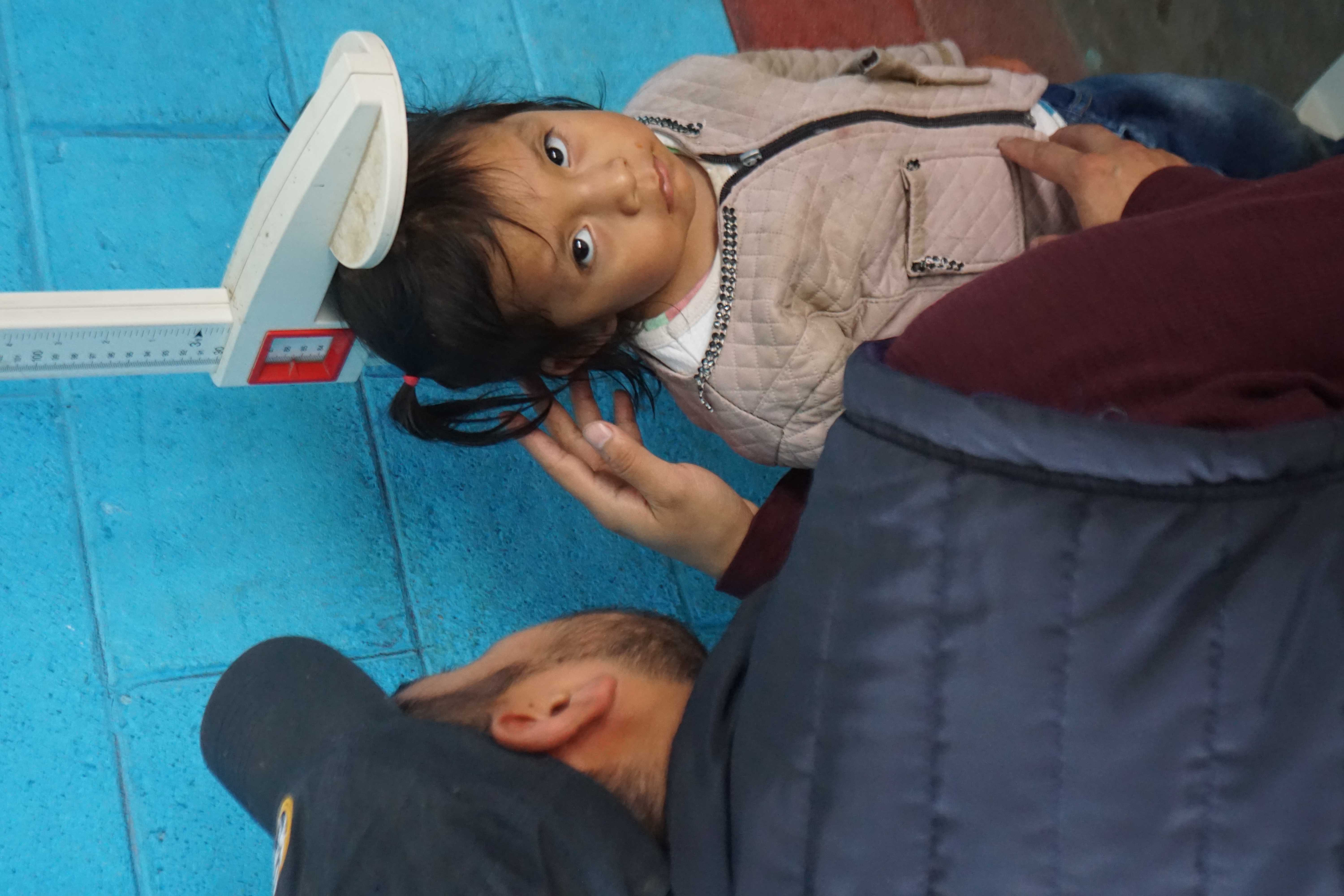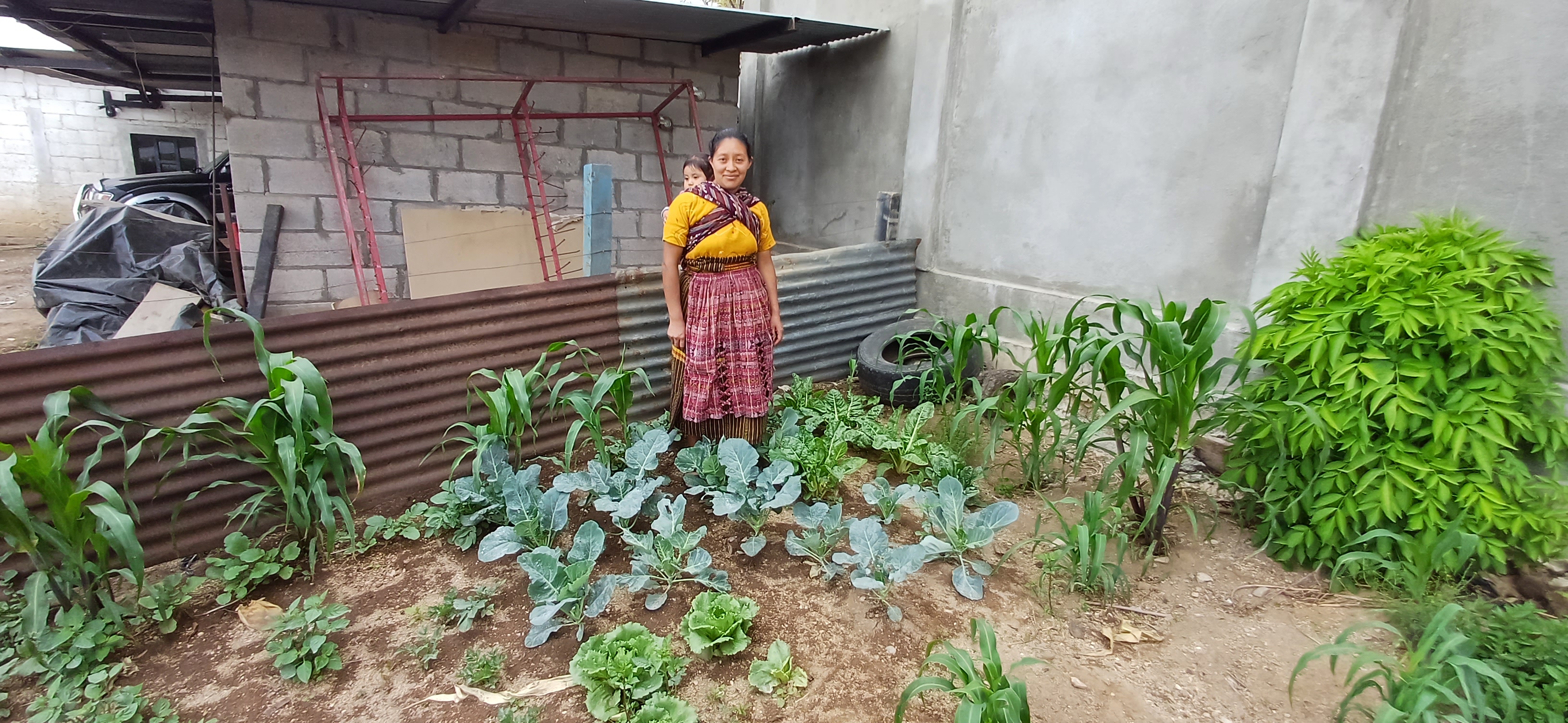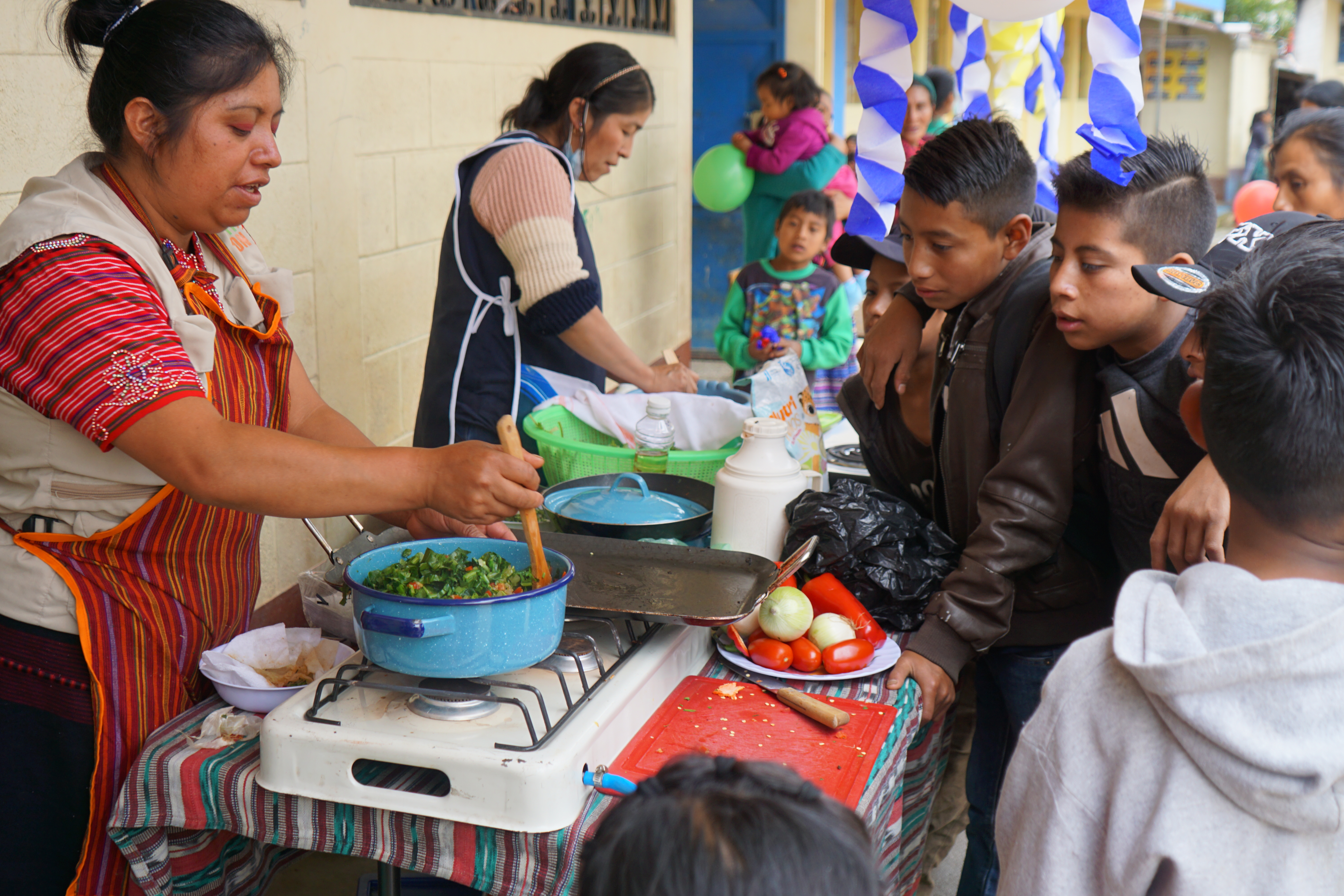Navigating food sovereignty and health in the western highlands

For Indigenous Maya communities living in the dry highlands of Guatemala, water has always been an invaluable resource, traditionally revered through ceremonies and careful usage. However, as accessibility has improved, and with it the quality of daily life, convenience has diminished the traditional way of thinking about this precious resource.
While some traditions endure, many aspects of life in Indigenous Maya communities are changing—for better or for worse. Navigating these changes means also exploring issues such as food sovereignty, as the right for people to define their own food systems becomes more critical amidst shifting lifestyles, health and beliefs. As part of our Guatemala in Focus appeal, we explore how these changes, influenced by a range of factors, are affecting the communities we support through our local partners, and look at steps being taken to regain food sovereignty.
Food sovereignty, something which Indigenous Maya communities have been deprived of for many generations, is the right of people to define their own food systems and exercise autonomy over them. This concept goes beyond ensuring food security, which is about having enough food to eat, emphasising the need for food that is healthy, culturally appropriate, and produced through ecologically sound and sustainable methods.
Throughout Guatemala’s history food insecurity and famine have not been uncommon for Indigenous Maya communities. The civil war (1960–1996) left generations traumatised, with famine and conflict compromising childhood growth and prenatal development, resulting in widespread malnutrition.
“We all plant crops here, but we just plant maize and beans, this is our main foodstuff, and we consume what we plant,” Maria Marta Pu, Chuicaca, Santa María Chiquimula.
In Indigenous Maya communities, most people grow their own food, typically limited to the tres hermanas (three sisters) which the traditional diet is based around: maize, beans, and squash. Any excess produce is sold to generate income.
In the 1950s, international corporations introduced chemical fertilisers to boost agricultural production, transforming the agricultural practices of Indigenous Maya communities. While these chemicals initially increased productivity, food security, and income, they also altered the soil composition, affected the local ecology, and influenced farmers’ choice of seeds. Because of this, the food system remains heavily dependent on these chemicals sold by international corporations, which are purchased in large quantities by local authorities for local farmers. This dependency has limited people’s autonomy over their own food systems.
Today, ultra-processed foods and cheap, carbonated drinks have replaced traditional homemade meals and beverages at celebrations and gatherings, reflecting both economic pressures and cultural shifts, influenced by global markets.
Abandoning a traditional diet, including foods such as green leaf broths, is increasingly seen as a status symbol, marking a shift towards a ‘modern’ diet and away from what is perceived as old-fashioned. Food sovereignty remains crucial amidst evolving lifestyles and dietary changes associated with ‘modernity’. The shift towards canned foods and packaged snacks, driven by convenience and economic factors, reflects broader societal changes influencing Indigenous Maya communities. While these changes have reduced women’s labour and introduced conveniences, maintaining food sovereignty is ensures the preservation of cultural identity, and the promotion of healthy, resilient and sustainable food systems. As communities navigate these shifts, balancing tradition with adaptation is essential to securing a future where food systems are equitable, ecologically sound, and reflective of the community’s values and needs – both nutritionally and culturally.

This transition has led to severe health consequences throughout Indigenous Maya communities in Guatemala. The huge rise in obesity-related conditions like diabetes and cardiovascular diseases further underscores the impact of these dietary changes on community health. Meanwhile, undernutrition-related health impacts such as anaemia affect 40-50% of women of childbearing age, and rates of chronic malnutrition among children reaching up to 70% in some communities. This represents a double burden in Indigenous Maya communities, which has yet to be recognised by the Ministry of Health (MoH).
Economic pressures exacerbate these dietary shifts. The cost of basic foods and protein sources has sharply risen in the past few years, while wages have stagnated, making nutritious foods inaccessible for many.
“Everything is very expensive nowadays…”, Dominga de León, a mother of two from Aldea Twi Pox, Concepción Chiquirichapa.
This economic strain means families are choosing more affordable, but less nutritious, processed foods, contributing to worsening health outcomes. Moreover, climate change has introduced additional challenges, with unpredictable weather patterns affecting crop yields and therefore both food security and income for farmers.
Another barrier Indigenous Maya people face in achieving food sovereignty is the MoH’s approach to nutrition education, which often uses language that is inaccessible and detached from Indigenous Maya perspectives on food and health, such as poorly explained references to macronutrients.
This communication gap extends to healthcare settings, where culturally insensitive practices and a lack of Indigenous language-speaking staff mean that people often have a poor experience whilst under MoH care. For instance, postpartum care often overlooks the Indigenous Maya tradition of consuming ‘hot’ foods to aid recovery, which involves balancing hot and cold elements for health. This highlights the urgent need for healthcare practices that respect and integrate Indigenous Maya traditions, such as including access to traditional medicines like herbal teas during hospital stays.
Find Your Feet support local partners to approach this complex issue in a multi-pronged way, aiming to bridge the gap between the MoH and Indigenous Maya communities. In pursuit of health and food sovereignty, fostering trust and understanding through culturally sensitive healthcare initiatives is an essential part of this work. Our local partners are members of the Indigenous Maya communities that they work in, ensuring that they maintain community relevance and effectiveness, acknowledging that meaningful change requires continuous long-term effort and resourcefulness.
“The majority of community participants commented that they did not know how to plant vegetables, since in the community they are dedicated to growing only corn, beans and broad beans”, Silvia Vásquez, Project Coordinator.
Find Your Feet supports the establishment of v gardens at health posts, where local staff engage the community in every stage, from composting to harvesting, teaching skills to be replicated at home. Those without land receive guidance on innovative container gardening, ensuring everyone can access nutritious foods.
“A vegetable garden is important, because it helps us have vegetables to hand, and it’s cheaper for us than buying. The most interesting thing was seeing how different vegetables are planted, […] there were some that I’d never seen, such as Hierbamora (black nightshade) – I loved seeing that. […] I have learnt how to make organic fertiliser, and natural insecticides; I’d never seen that before, and now I know how to make them. The materials used we already have in the home, such as the firewood ash, animal fat soap and lime, we always have those in the kitchen, and usually just throw the ash out, instead of using it.” Brenda Escalante, pregnant woman from Aldea Twi Pox, Concepción Chiquirichapa.

Our local partners share seeds and plants with those involved, supporting them to cultivate these vegetables at home, focusing on nutrient dense, weather-resistant varieties and climate-adaptive techniques. Community members have become enthusiastic about their own gardens and diversifying their produce, often discussing this among themselves and sharing their own tips. This initiative highlights the vital role of community-based solutions in securing food sovereignty.
“It interested me a lot. It’s important to have a vegetable plot, because we ourselves can care for it. On the other hand, if we buy in the market, who knows how it’s watered, it may be with dirty drainage water.” Dominga de León, a mother of two from Aldea Twi Pox, Concepción Chiquirichapa.

Find Your Feet supports community workers to host cooking demonstrations using the vegetables and herbs grown in the demonstrative gardens. These sessions show families innovative ways to integrate vegetables into their meals. Our Partners are also working to involve the Ministry of Health in these efforts, to improve their relevance within communities and enable them to do their own accessible cooking demonstrations.
We support local partners to engage mothers and community members in interactive activity-based sessions which emphasise the benefits of being well-nourished and the dangers of malnutrition, especially during pregnancy and for children – including addressing areas of health misinformation.
Our local partners also work closely with Ministry of Health staff and Traditional Birth Attendants (read our latest email on TBAs here), training them on how to advise and advocate around nutrition, covering issues such as breastfeeding and dietary supplements.
Through our local partners we’ve reached 148 pregnant women, 219 new mothers, 40 Ministry of Health staff, and 67 Traditional Birth Attendants, providing them with valuable insights into nutrition, especially during pregnancy. This has created an enthusiasm for change and knowledge-sharing within communities.
The journey towards achieving food sovereignty—including health, culturally appropriate, and autonomous food systems—cannot be addressed through short-term interventions alone, especially amidst the complexities of navigating the influences of ‘modernity’. It entails ensuring that communities can access food that is both healthy and culturally appropriate, without economic or knowledge barriers.
Through Find Your Feet’s ongoing support, communities not only gain essential gardening skills and nutritional knowledge but also reclaim autonomy over their food systems, often influenced by external factors. By promoting local agriculture and self-sufficiency, we help to safeguard cultural food practices and community health. These steps represent progress towards long-term change rather than immediate transformation, contributing to environmental sustainability and securing future generations the tools to a sovereign food system.
You can find out more about our work in Guatemala and ways you can support these kind of initiatives here.





